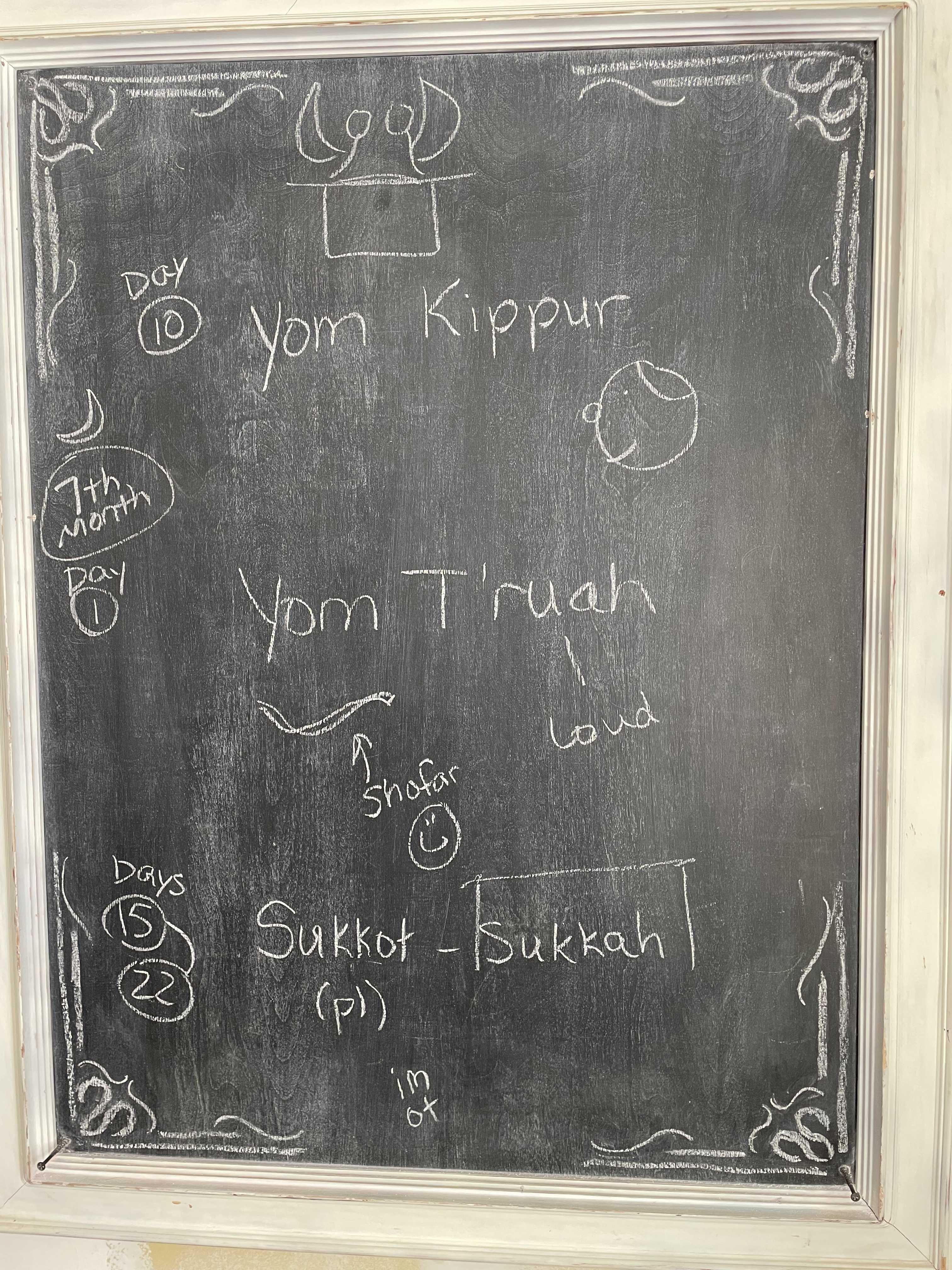Watch
Events
Articles
Market
More
We drew this picture on the chalkboard today, to review the Fall Feasts. See if you can follow along and make sense of my drawing.
The Seventh Month
- Month comes from the word "moon." The seventh month starts when the seventh new moon of the year is seen in Jerusalem. This year, that happened Tuesday evening, September 27. Since days start at sunset, that started Day 1 of the seventh month, and Day 1 continued all day Wednesday, September 28.
Day 1 is Yom Teruah
Leviticus 23:23-25
- Yom is the Hebrew word for "day." (Yom rhymes with home.) Teruah comes from a word that means loud noise, which is usually made with shofars, silver trumpets, or shouting. So this is Yom Teruah, the Day of Trumpets or Shouting. Most people call it the "feast" of trumpets, but it's not really called a feast day in the Bible. It IS a Sabbath, or day off work.
Day 10 is Yom Kippur
Leviticus 23:26-32, Leviticus 16
- This is the "day" (yom) of "covering." Kippur (the u has an /oo/ sound) means covering. You might recognize the kippah, or hat (or covering) that Jewish men wear. It covers their heads. This is the day of covering, or atonement. On this day, the high priest applies the blood of the sacrificed goat to the mercy seat on the top of the ark of the covenant in the Holy of Holies in the tabernacle or temple. When Yeshua died, the book of Hebrews tells us that His blood was applied to the REAL ark of the covenant in heaven. The tabernacle or temple on earth is only a picture of the real one in heaven, where His blood covered our sins once for all. The object lesson on earth helps us understand and thank Him for what He did. So this is the Day of Atonement, or Day of Covering of sin, or Yom Kippur. It is a complete day of rest and humbling ("afflict" in KJV), because He did all the work. We cannot earn our covering or atonement, so we completely rest on this day. Some people fast from food, but this is a tradition not commanded in Scripture.
Days 15 through 22 are Sukkot.
Leviticus 23:33-43
- Sukkot is a plural word in Hebrew. You can tell plural words because of the -ot or -im ending, like English has an -s or -es ending. It is plural for Sukkah, which means a temporary dwelling, much like a tent (or tabernacle or booth in older English). In the wilderness, the Israelites lived in tents for 40 years. Those people who are born as Israelites are commanded to live in temporary dwellings for a week each year to remember this time and look forward to our permanent homes when Yeshua comes back to live as king on earth. The first and last days are Sabbaths, days off work, but we can cook and set up our "temporary dwellings." We are also commanded to rejoice the entire week, so this is a fun week. When there was a temple or tabernacle in Israel, people would set aside a tithe (10%) all year to bring to the Levites (their spiritual leaders/teachers), the poor, and to have money for this vacation---- er, trip to Jerusalem-- for food, drink, feasting, celebrating, gifts, and sharing with others.
The Fall Feasts are sometimes called “moedim.” (See the -im plural ending there?) This word means appointments. These are some of the times when God meets with His people. You can read about all the moedim in Leviticus 23. It seems important to put His appointments on our calendar and keep them. They all teach us about Yeshua and God’s plan.



